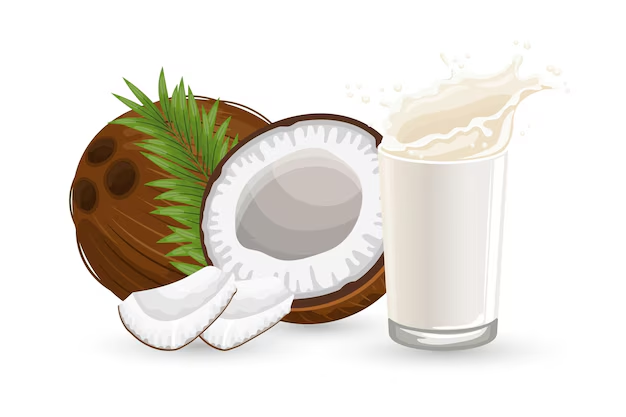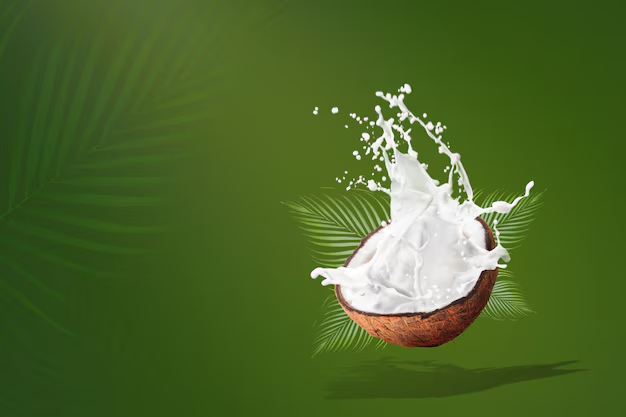Coconut milk is a popular ingredient with a rich, creamy texture that adds flavor to dishes and beverages. If you’re wondering, does coconut milk contain caffeine, you’re not alone. This question often arises due to its frequent use in coffee and tea alternatives. In this article, we’ll uncover the nutritional properties of coconut milk, compare it to other plant-based milks, and confirm its caffeine content.
What Is Coconut Milk?
Coconut milk is a versatile plant-based liquid extracted from the grated flesh of mature coconuts. It is not to be confused with coconut water, which is the clear liquid inside a coconut. Coconut milk has a creamy texture and distinct flavor, making it a favorite ingredient in many recipes.
Common Uses of Coconut Milk
Coconut milk is a staple in several cuisines, especially Southeast Asian, Indian, and Caribbean cooking. It is used in soups, curries, smoothies, and desserts. Additionally, it has become a go-to alternative for dairy milk in lattes and plant-based recipes.
Purpose of This Article
This article aims to clarify whether coconut milk contains caffeine, explore its nutritional profile, and compare it to other plant-based milk options.
Nutritional Profile of Coconut Milk
Coconut milk offers a unique blend of nutrients, making it both delicious and beneficial for health. Below, we examine its macronutrients, vitamins, and minerals while confirming its caffeine-free status.
Macronutrients in Coconut Milk
Coconut milk is calorie-dense due to its high fat content. Here’s a breakdown of its macronutrients:
- Fats: Coconut milk is rich in saturated fats, particularly medium-chain triglycerides (MCTs). These fats are easily digested and can provide quick energy.
- Proteins: It contains a small amount of protein, making it less protein-rich compared to other plant-based milks.
- Carbohydrates: The carbohydrate content in coconut milk is minimal, with most of it coming from natural sugars.
Vitamins and Minerals in Coconut Milk
Coconut milk is a good source of essential nutrients. Key vitamins and minerals include:
- Vitamin C: An antioxidant that supports the immune system.
- Iron: Helps in oxygen transport and prevents anemia.
- Magnesium and Potassium: Promote heart health and proper muscle function.
Absence of Caffeine
Coconut milk is naturally caffeine-free. Unlike coffee, tea, or certain plant-based beverages, pure coconut milk does not contain caffeine. Whether consumed plain or in recipes, coconut milk delivers its benefits without the stimulating effects of caffeine.
Nutrition Value Table
Here’s a quick glance at the nutritional value of 1 cup (240 ml) of unsweetened coconut milk:
| Nutrient | Amount |
| Calories | 45-60 |
| Total Fat | 4-5g |
| Saturated Fat | 3-4g |
| Protein | 0.5-1g |
| Carbohydrates | 1-2g |
| Vitamin C | 3-4% DV |
| Iron | 10% DV |
Related to Read: Does Coconut Water Contain Caffeine?
Comparing Coconut Milk to Other Plant-Based Milks
Plant-based milks are a favorite among those seeking dairy-free alternatives. Let’s see how coconut milk stacks up against other popular options.

Almond Milk
Almond milk is light, nutty, and low in calories. Here’s how it compares:
- Nutritional Highlights: Almond milk is low in fat and contains Vitamin E, an antioxidant.
- Uses: It’s often used in baking, smoothies, and as a coffee creamer.
- Caffeine Content: Like coconut milk, almond milk is naturally caffeine-free.
Soy Milk
Soy milk is a protein-packed alternative that is especially popular among vegans and vegetarians.
- Nutritional Highlights: Soy milk offers about 7g of protein per cup, along with calcium and vitamin D.
- Uses: It works well in savory dishes, lattes, and baked goods.
- Caffeine Content: Soy milk is also caffeine-free.
Oat Milk
Oat milk has gained popularity for its creamy texture and mild flavor.
- Nutritional Highlights: It contains more carbohydrates than other plant-based milks and is often fortified with vitamins.
- Uses: Great for frothy coffee drinks, cereal, and soups.
- Caffeine Content: Like other plant-based options, oat milk contains no caffeine.
Caffeine Content in Plant-Based Milks
One key similarity among most plant-based milks is their lack of caffeine. Unless infused with coffee or tea, almond, soy, oat, and coconut milk are naturally free of caffeine. This makes them ideal for individuals seeking non-caffeinated beverages or those who prefer to control their caffeine intake.
Coconut milk is a rich and flavorful ingredient with a completely caffeine-free profile. Its creamy texture, nutritional benefits, and versatility make it a beloved choice among plant-based milks. By comparing it to other non-dairy alternatives, it’s clear that coconut milk stands out for its unique composition while sharing the common trait of being naturally caffeine-free.
Coconut Milk in Coffee and Tea Beverages
Coconut milk is a creamy, dairy-free alternative that works well in a variety of coffee and tea drinks. While the milk itself is naturally caffeine-free, its combination with caffeinated beverages like coffee and tea can alter its overall profile. Let’s explore how coconut milk pairs with these beverages and how it fits into the world of ready-to-drink options.
Coconut Milk Lattes
Coconut milk lattes are a popular choice among coffee enthusiasts seeking a dairy-free option with a rich, creamy texture. These drinks blend the natural sweetness of coconut milk with the bold flavors of coffee.
Caffeine Content in Coconut Milk Lattes
The caffeine content in a coconut milk latte comes entirely from the coffee used, as coconut milk itself contains no caffeine. A standard cup of coffee has around 95 mg of caffeine, and this remains unchanged when coconut milk is added.
Flavor and Texture Benefits
Coconut milk enhances the latte experience by adding a velvety texture and a mild coconut flavor. It pairs especially well with espresso-based drinks like cappuccinos and macchiatos.
Coconut Milk Teas
Coconut milk teas, such as chai or matcha lattes, are another popular way to enjoy this plant-based milk. The unique flavor of coconut milk blends beautifully with the spices in chai or the earthy notes of matcha.
Caffeine Content in Coconut Milk Teas
The caffeine in coconut milk tea comes from the type of tea used. For example:
- Chai Tea: Contains about 40-70 mg of caffeine per cup.
- Matcha Tea: Provides roughly 25-70 mg of caffeine per serving.
Adding coconut milk doesn’t change these levels but enhances the drink’s richness and flavor.
Decaf Options
For those avoiding caffeine, decaffeinated chai or herbal teas can be used with coconut milk. This allows you to enjoy the creamy texture without the stimulating effects of caffeine.
Ready-to-Drink Coconut Coffee Beverages
Pre-packaged beverages combining coconut milk and coffee have become increasingly popular. These drinks offer convenience and a delightful mix of flavors but come with varying levels of caffeine.
Examples of Ready-to-Drink Products
- Coconut Milk Cold Brew: Often contains 150-200 mg of caffeine per bottle, depending on the amount of coffee used.
- Coconut Milk Iced Coffee: Typically has 50-120 mg of caffeine, depending on the brand and serving size.
Reading the Labels
It’s essential to check product labels for caffeine content and added ingredients. Some beverages may include sweeteners or additives that could affect your health goals.
Health Considerations
While coconut milk is a nutritious and versatile ingredient, there are some considerations to keep in mind, especially when combined with caffeinated drinks.

Benefits of Caffeine-Free Beverages
For individuals looking to reduce their caffeine intake, coconut milk is an excellent base for caffeine-free beverages. Benefits include:
- Reduced anxiety and improved sleep.
- Lower risk of caffeine-related side effects like jitters.
- A soothing alternative for those with caffeine sensitivities.
Nutritional Benefits of Coconut Milk
Coconut milk offers healthy fats and essential nutrients. These include:
- Medium-Chain Triglycerides (MCTs): These fats may boost metabolism and energy levels.
- Iron and Magnesium: Essential for muscle and nerve function.
- Natural Sweetness: Coconut milk can reduce the need for added sugar in beverages.
Potential Concerns
While coconut milk has many health benefits, it’s also calorie-dense and high in saturated fats. Overconsumption can lead to:
- Increased calorie intake, contributing to weight gain.
- Elevated cholesterol levels in individuals sensitive to saturated fats.
Balancing your intake and choosing unsweetened coconut milk can help mitigate these concerns.
Related to Read: Is Coconut Water Good for Hydration? A Detailed Guide
Conclusion
Coconut milk is a versatile and caffeine-free ingredient that enhances coffee, tea, and ready-to-drink beverages. Its creamy texture and nutritional benefits make it a favorite among dairy-free alternatives.
Practical Takeaways
- Pure coconut milk does not contain caffeine.
- The caffeine content in coconut milk beverages depends entirely on added ingredients like coffee or tea.
- Always check labels on pre-packaged drinks to understand their full nutritional and caffeine profiles.
Coconut milk is a fantastic addition to your pantry, whether you enjoy it in a latte, tea, or as a cooking ingredient.
FAQs
1. Is Coconut Water Caffeine-Free?
Yes, coconut water, like coconut milk, is naturally caffeine-free. It’s a hydrating and refreshing drink rich in electrolytes.
2. Do Flavored Coconut Milks Contain Caffeine?
Some flavored coconut milks may contain caffeine if they include ingredients like coffee or chocolate. Always read the label to confirm.
3. Can I Use Coconut Milk in Decaffeinated Coffee?
Absolutely! Coconut milk pairs beautifully with decaf coffee, providing creaminess and flavor without caffeine.
4. What Is the Best Coconut Milk for Coffee?
Unsweetened, full-fat coconut milk works best for a creamy texture and balanced flavor in coffee.
5. Does Coconut Milk Work Well in Herbal Teas?
Yes, coconut milk complements herbal teas wonderfully, especially varieties like chamomile or rooibos, for a soothing and caffeine-free experience.

